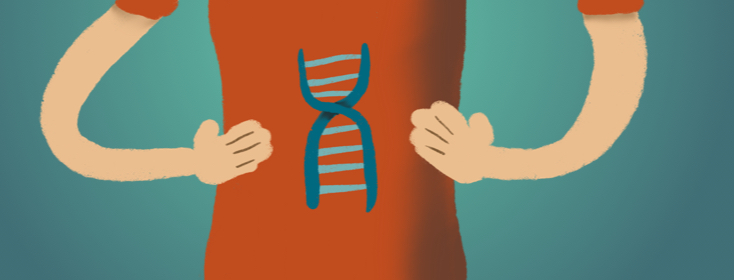IBD in the Genes
Did you know that over 50 genes have been linked to inflammatory bowel disease (IBD)?1 Although no one knows exactly what causes IBD, your genetics may factor in. So if you have inflammatory bowel disease, what does this mean for your family? According to our 2017 IBD in America survey, 42% of IBD patients also have a relative with IBD, and 45% of patients have a relative with an autoimmune condition.
So, we asked our IBD community about their families’ experiences with IBD and this is what you shared:
I have a relative with Crohn’s Disease….
“My sister had Crohn's, as do I. Also, I have a second cousin that has it as well.”
“My brother and I both have Crohn's.”
“Have two nephews with Crohn's...one second cousin”
“My daughter and I both have Crohn’s.”
“One of my 29 year old sons has Crohns, as well as me. My mother and a niece also had/have Crohn's.”
For many of our community members, IBD seems to “run in the family”. On average, 10-20% of cases of Crohn's are genetic2, and research shows that several genes are associated with Crohn’s, including the ATG16L1, IRGM, IL23R, and NOD2 genes.3 The genetic traits of Crohn’s Disease is most apparent in twins: ~50% of identical twins will have Crohn’s disease if their twin has it too4. If you have Crohn’s, consider talking to your family and extended family about your condition. Because approximately 15% of Crohn’s patients also have a relative with IBD3, you may have an IBD-ally who you don’t even know about!
I have a relative with Ulcerative Colitis…
“My mom has Colitis with IBD, and I have Crohns with IBD”
“Both of my grandmothers had UC. Ugh!”
“My niece has UC, and my mother has never been diagnosed but has always had problems.”
“Granddaughter... ulcerative colitis.”
“My maternal grandfather was diagnosed with UC... I’ve had severe Crohns for 20 years, and my mom has mild-moderate UC.”
According to many of our community members, some of your family members are affected by the other major from of IBD: Ulcerative Colitis. While Crohn’s disease and Ulcerative Colitis (UC) have some similarities, UC affects the large intestine and rectum, while Crohn’s can affect any part of the digestive tract. On average, 10-20% of cases of UC are genetic2, and several genes are associated with UC, including the BCB1, IL10RA, IL10RB, IL23R, IRF5, and PTPN2 genes.5 While your UC-affected family members may have different experiences and symptoms than you do, you can still rely on them for understanding and support when managing life with IBD.
I have a relative with an autoimmune condition...
“Just my 9 year old son, but lots of other autoimmune in the family”
“No relatives with IBD, but my Dad had psoriasis”
Although Crohn’s disease and Ulcerative Colitis have not been definitively classified as autoimmune conditions, both Crohn’s and UC have characteristics of autoimmune disease.6 As described by some community members, people affected by Crohn’s disease may have relatives with autoimmune conditions, such as rheumatoid arthritis, psoriasis, and multiple sclerosis.7 Although autoimmune conditions can occur in any family, you may have more relatives with autoimmune conditions if someone in your family has IBD2.
I’m the only one!
“I'm the only one and I have 6 siblings. No one has GI diseases.”
“I’m the only one out of six sibs, too...Crohn’s”
“No one else in my family has had any issues when it comes to their digestive system or any other symptoms related to Crohn's, including no other autoimmune diseases.
“I'm the only one diagnosed with Crohn's, but my grandfather on my mom's side always had stomach issues. He passed at age 58.”
According to our 2017 IBD in America Survey, around 45% of IBD patients have a family member with IBD or an autoimmune condition. However, as described by many of our community members, “I’m the only one!”
While you may be the only person in your family who has been diagnosed with Crohn’s or UC, you know that IBD can impact the whole family. With the holiday season coming up, family get-togethers can be tricky, especially if you’re trying to avoid your trigger foods or dealing with IBD fatigue. If you’re a parent, it can also be difficult to manage the needs (and stress!) of your kids, while also managing your symptoms. Even if you’re the only person in your family with IBD, family can be a critical source of love and support throughout your journey.
If you need help talking to your family about IBD, or if you’re looking for support from your peers, consider connecting with our community and share your story.

Join the conversation